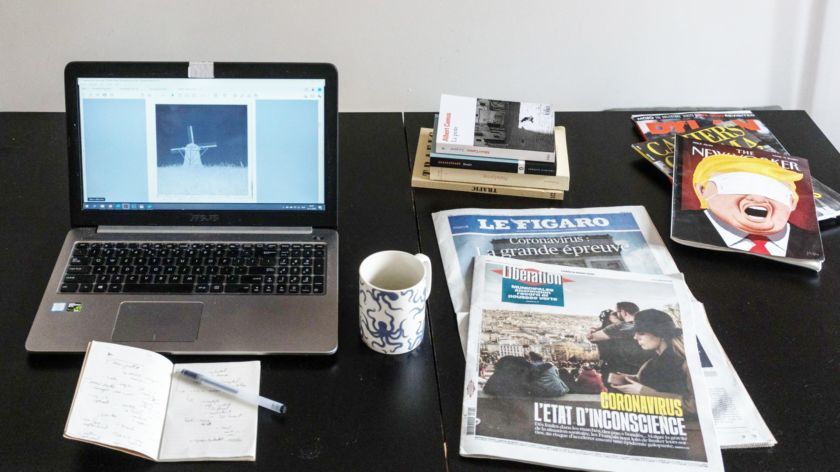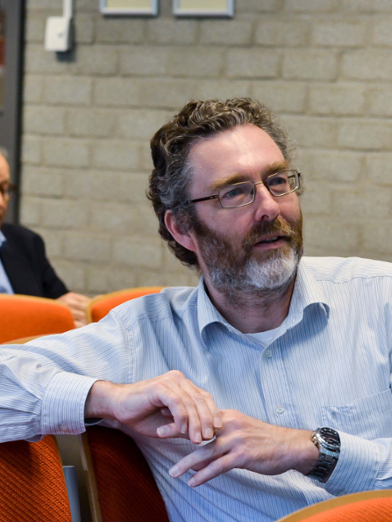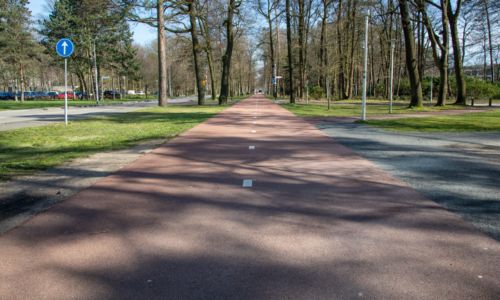Working from home is easier without kids
-
 Wilco Versteeg's desk at home. Photo: Wilco Versteeg
Wilco Versteeg's desk at home. Photo: Wilco Versteeg
Radboud University staff has to work from home as much as possible, but can they? 'People without kids could go and write a book now, but for me it is mayhem.'
Wilco Versteeg, literature teacher and photographer:
‘Together with my girlfriend and two cats, I live in an apartment in Paris. We decided to go in voluntary quarantine a couple of days ago, but by now it is not a choice anymore. In France, only necessary movements allowed, for groceries, medical care or work, but I do think something is to be arranged when I absolutely have to be in The Netherlands.’
‘Normally, I would have gone to The Netherlands yesterday, but that did not seem like a good idea. In the train and at train stations you do meet a lot of people. Both of my parents, who live in Deventer, are 75 years old. I am worried about them, especially since I am an only child. Luckily, friends have offered to go shopping for them if necessary.’
‘For a researcher, this could be golden times to get a lot of work done, but these circumstances are not ideal for me. At the moment, I don’t teach, but the thesis supervision continues and I receive a lot of questions from students. I teach small groups in French, English, and Cultural studies. We are not used to remote education, but a lot is possible these days.’
‘As a cultural scientist, the way people react to this crisis interests me. There is a weird atmosphere in the streets. After the terrorist attacks it was also quiet in Paris, but this is different. People avoid each other, they quickly move to a meter’s distance when they see somebody on the street. Still, I am positively surprised about how people handle the corona crisis. In supermarkets, it is relatively quiet, there is no rush on toilet paper and the shop shelves don’t have to be refilled like in The Netherlands. Young people do take the crisis too lightly. They still go to clubs, and walk the streets hand in hand. Maybe that’s why the measures become stricter all the time.’
Ellen Mastenbroek, European Public Policy professor:
‘My boyfriend and I both work from home. With three children of ten, thirteen and sixteen years old, the house is a bit of a chaos. Luckily, we both have a study. We have equipped those a bit better over the last couple of days, with some extra screens – just a moment, one of the children walks into the room (laughs).’

‘Wednesday or Thursday, we will hear how schools are planning to organise remote teaching. Until then, it is a bit like a holiday for the children. After that, they will have to do the work again, but that also asks for our supervision. It will be quite a big job. I cannot imagine meeting our working hours. My partner and I have made a work schedule. Last Saturday, I still worked a full day on campus.’
‘The biggest difference with working on campus? The lack of rest. People without kids could go and write a book now, but for me it is mayhem. I am reluctant to ask for a babysitter, because the kids are a bit snotty. I have asked the oldest to keep an eye on the other two now.’
‘Luckily, I had no classes this semester. There are some individual resits for the subject I am teaching. All meetings and conferences are cancelled. That is nice, because it gives me time, but it might also mean that soon, we will be faced with a lot of work.’
‘The corona crisis makes you look at work differently. I follow the news in-between work and think of friends and family more often. It is harder to focus on work. There is so much at stake in society.’
Martijn de Koning, assistant professor Islamic studies:
‘I don’t have children, so that makes working from home significantly easier. In my study, I work on articles more often. Yesterday, I placed two twenty-minute web lectures on Brightspace. Now, I am answering students’ practical questions. Later, I want to do some research and I’ll just see what comes up after that.’

‘At the university, there is more social contact of course. The Islamic studies department is not big: colleagues often visit each other, and students know where to find us. Now that the lectures and meetings are cancelled, you have to fill your own day. And for social contacts, there is always social media, Skype and telephone.’
‘The online thing is nice, but it cannot increase the study load.’
‘In the past, I made web lectures because I went abroad for a while. I try to keep them short: students say they think fifteen to twenty minutes is ideal. Whether I have tips for colleagues? Keep it simpel, for yourself and the students. And exchange tips with the people you work with. On Brightspace, you can make videos with powerpoint presentations. My colleague Mathijs van de Sande has made a tutorial on YouTube. A couple of tries and you’ll get it.’
‘The online thing is nice, but it cannot increase the study load. Some students have children or other heavy care tasks, and students can also get sick. Give them time and space to complete assignments at their own pace. And don’t assume that everybody has a great internet connection, because that is just not true.’
‘In one of my web lectures, I have incorporated the corona crisis. The call for prayer in Kuwait sounds a little different now. In stead of “hurry, come to prayer”, they now say “the prayer is in your home”. I also showed a photo of the wailing wall: it is nearly abandoned now.’
Wim van Meurs, professor European political history:

‘Working from home has its perks, especially in my role, as a group leader. Last week on Thursday, my schedule for this week was full of meetings, and now it is almost empty. I have much more time for research this way (laughs). Many standard meetings are cancelled, and talking through Skype is much faster and efficiënt, I noticed. This might be a lesson for when all of this is over.’
‘For the time being, the working from home doesn’t cause too many problems at our department. You don’t need too much to do your work as a historian. Yes, archives, they might be closed, but you can postpone a visit like that. Luckily, the library is still open. And some researchers were supposed to go to conferences, which are cancelled now, that is a pity. When these measures are just for three weeks, it is doable. After three months, it will become more problematic, then you will have the chance that PhD projects will take longer.’
‘I have advised everybody in my department to stay home. We discuss work through e-mail or Skype as much as possible. That works, but I do miss running into people in the halls. There, you hear about the small things that are on people’s minds and which you can easily solve. Maybe I can organise alternative Friday drinks through Skype this week, so we can see each other.’



